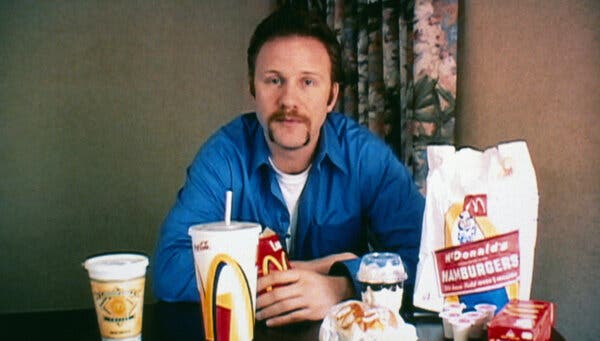“Super Size Me” helped lead a backlash against McDonald’s. Twenty years on, the industry is bigger than ever.
Listen to this article · 12:11 min Learn more
The camera zooms in on a large woman, sitting on a cooler at the beach. It cuts to a shirtless man, also quite large, his face blurred out. The next shot shows another overweight man, sitting on a beach towel with plastic grocery bags arrayed in front of him.
“America has now become the fattest nation in the world. Congratulations,” a voice narrates. “Nearly 100 million Americans are today either overweight or obese.” At the end of this soliloquy, the opening credits roll — accompanied by Queen’s “Fat Bottomed Girls.”
So begins “Super Size Me,” which was released 20 years ago this month.
Directed by and starring Morgan Spurlock, the bootstrapped, lo-fi documentary was a smash hit, grossing more than $22 million on a $65,000 budget. Following Mr. Spurlock as he ate nothing but McDonald’s for 30 days — and the ill effects that diet had on his health — the film became the high-water mark in a tide of sentiment against fast food. McDonald’s, specifically, became a symbol for the glossy hegemony of American capitalism both at home and abroad.

“McJobs” became a term for low-paying, dead-end positions, “McMansions” for garish, oversize houses. In 1992, the political theorist Benjamin Barber used the term “McWorld” as shorthand for emergent neoliberal dominance; seven years later, protesters against the World Trade Organization seemed to agree, launching a newspaper box through a McDonald’s window during the “Battle of Seattle” marches.
Two years after that, Eric Schlosser’s “Fast Food Nation” was published. A broad indictment of the entire fast-food industry, the best seller accused the industry of being bad for the environment, rife with labor issues, culturally flattening and culinarily fattening.
Thank you for your patience while we verify access.
